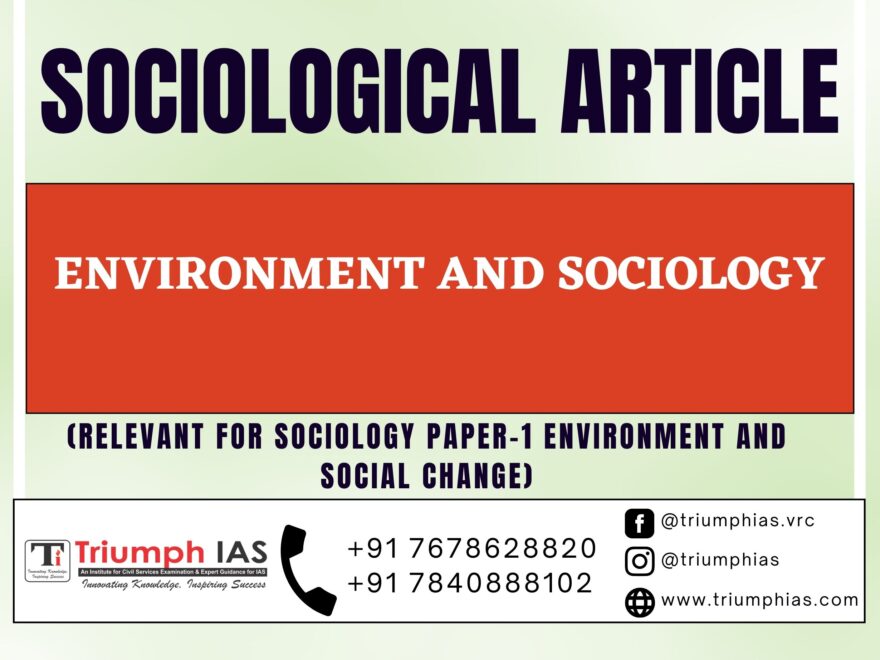ENVIRONMENT AND SOCIOLOGY
(Relevant for Sociology paper-I Environment and Social change)

Nowadays, environmental issues have become a matter of great concern. These environmental issues can be examined using a sociological viewpoint.
The field of environmental sociology explores the connections between human societies and the natural environment. Examining these connections is crucial for identifying environmental challenges and devising effective solutions.
Emergence of Environmental Sociology
In the 1970s, sociologists gained an understanding and sensitivity towards environmental problems, which led to a need for reevaluating prior sociological beliefs.
Theoretical Contributions to Environmental Sociology
Riley Dunlap and William Catton proposed a framework for environmental sociology based on several interconnected ideas. Firstly, they suggested that environmental issues have been neglected by classical sociology due to limited worldviews that fail to recognize the biophysical foundation of social life. Secondly, they argued that modern societies are unsustainable because they rely on finite reserves of fossil fuels. Thirdly, they contended that societies must prepare for an impending ecological disaster resulting from worsening environmental problems. Fourthly, they emphasized the need for adaptations and adjustments to prevent environmental crises. Lastly, they stressed that environmental issues are causing a paradigm shift in society that must be acknowledged.
Over the years, numerous scholars have contributed to the field of environmental sociology. Among them, Professor Kari Marie Norgaard is a notable figure. She is currently an associate professor of Sociology and Environmental Studies at the University of Oregon and has been teaching courses on environmental sociology and climate change for over fifteen years. Another noteworthy environmental sociologist is Professor John Bellamy Foster, who also teaches in the Sociology department at the University of Oregon and focuses on environmental sociology, Marxism, and political economy.
In the 21st century, there are numerous environmental problems, with global climate change being the most urgent issue facing humanity. Environmental sociologists are studying the human-caused factors that contribute to climate change, including political and economic causes. They are also examining sociological problems that arise as a result of climate change. For instance, unusual weather patterns such as droughts and floods can increase the likelihood of interpersonal violence and armed conflicts.
According to the American Sociological Association, the focus of environmental sociology on environmental inequality reflects the discipline’s general emphasis on social inequality. Environmental inequality is pervasive globally, with developing nations experiencing greater impacts from climate change than developed nations, providing numerous examples of the issue.
Follow us :
-
🔎 https://www.instagram.com/triumphias
🔎https://www.youtube.com/c/TriumphIAS
https://t.me/VikashRanjanSociology
Find More Blogs
Scope of the subject and comparison with other social sciences
Changing family structure in India Modernity and social changes in Europe
environmental sociology, human societies, natural environment, sociological viewpoint, emergence, theoretical contributions, Riley Dunlap, William Catton, paradigm shift, Kari Marie Norgaard, John Bellamy Foster, climate change, political causes, economic causes, environmental inequality.#Sociologyforupsc #sociologyforupscinhindi #sociologyforupscgs1 #sociologyforupscprelims #sociologyforupscinenglish #sociologyforupscmainsinhindi #sociologyforupscoptionalinhindi #sociologyforupscmains #sociologyforupscplaylist #sociologyforupsclecture1 #sociologyforupsccse #sociologyforupscoptional #syllabusofsociologyforupscoptional #bestbookforsociologyforupsc #sociologyoptionalforupscanswerwriting #sociologyoptionalforupscanukumari #sociologyoptionalforupscabhijeet #sociologyoptionalforupscanalysis #sociologyoptionalforupscalllectures #sociologysyllabusforupscanalysis

